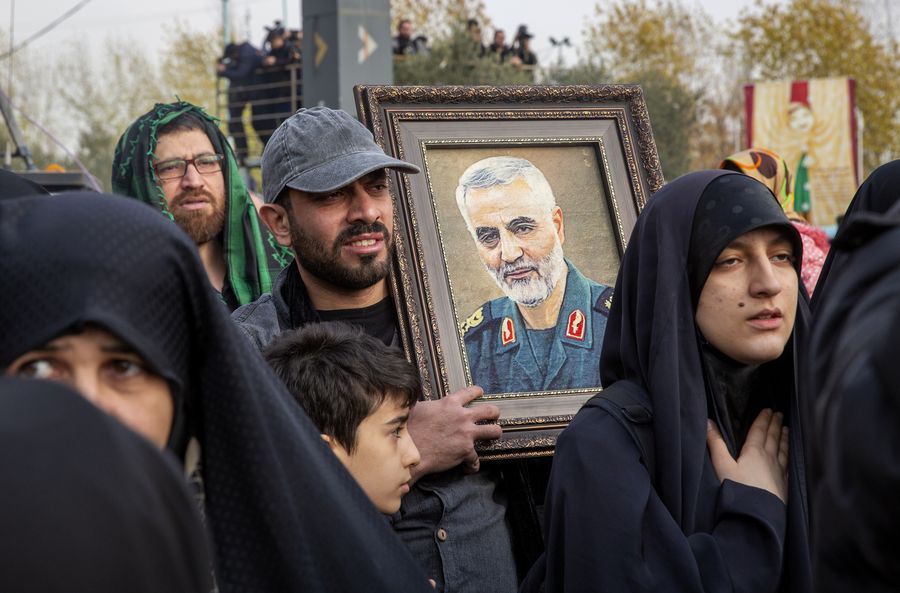
A man holds a picture of top Iranian commander Qassem Soleimani during a protest in Tehran, Iran, on Jan. 3, 2020. (Xinhua/Ahmad Halabisaz)
Israel has been trying to keep out of the tension following the U.S. killing of Qassem Soleimani, head of the Iranian elite Quds force.
by Keren Setton
JERUSALEM, Jan. 7 (Xinhua) -- As hundreds of thousands of Iranians participated this week in the funeral procession of Qassem Soleimani, head of the Iranian elite Quds force, Israelis were reserved in their response, trying to keep out of the current tension.
After the United States announced it killed Soleimani in a surgical strike last Friday in Iraq, Israeli Prime Minister Benjamin Netanyahu justified the U.S. decision.
"President Trump is deserving of all esteem for taking determined, strong and quick action. I would like to reiterate Israel fully stands alongside the U.S. in the just struggle for security, peace and self-defense," he said at the beginning of a cabinet meeting in Jerusalem.
According to Yossi Mansharof, a researcher in the Jerusalem Institute for Strategy and Security and the Ezri center for Iran and Persian Gulf Studies at the University of Haifa, Hezbollah in Lebanon and Iranian forces in Syria are currently too involved in internal instability and will not choose to lash out at Israel to avenge the death of their patron.
In Gaza, the Islamic Jihad could attempt to spark a conflict but "this will not be significant or have major impact on Israel," he said.
"Any escalation between Iran and the U.S. makes Israel want to be prepared for the next conflict with Hezbollah," said Sarit Zehavi, a former Israeli military intelligence officer and founder of the Alma Research and Education Center on Israel's Security Challenges on its Northern Borders.
In his commemorative speech on Soleimani, Hezbollah leader Hassan Nasrallah rarely mentioned Israel, signaling it was out the game for now, aiming most of his retaliatory threats at the United States.
"We can very carefully evaluate that the Iranians are not going to retaliate on Israel's northern borders, we are not there yet," Zehavi told Xinhua.
Israeli media reported Tuesday morning that the security cabinet assessed that the country was not going to be the target of an Iranian response.
"Israel is not the main character in this story," said Mansharof, "Israel needs to sit back, help the Americans with intelligence as much as possible and be prepared to defend herself."
Cabinet ministers were ordered by Netanyahu to keep a low profile after the assassination, to keep Israel on the sidelines of the U.S.-Iranian confrontation.
For years, Netanyahu has made Iran his top foreign and defense policy priority, missing no opportunity to tell the world about the danger as he perceived it.
When the United States withdrew from the Iranian nuclear agreement in 2018, it was a victory for the Israeli leader, who saw it as confirmation that he was not alone in his battle against the Iranian regime.
On Friday morning, as the news of the death of Soleimani was released, there was a collective sigh of relief in Israel but also concern. While Trump acted on behalf of U.S. interests in ordering the killing of Soleimani, Iranians knew Israel would be satisfied with the move.
Hence, retaliation might also be directed towards Israel. While defense officials believe Israel will not be an immediate target, the spiraling nature of the conflict in the Middle East gives no guarantees.
When the United States pulled its forces out of Syria late last year, there was concern in Israel. It was perceived as the superpower taking a step back in its Middle Eastern involvement. As Soleimani's convoy was targeted last Friday, Israelis saw it as a sign of the U.S. comeback as a major player in the region.
"Until now the Americans focused economic and diplomatic efforts against Iran, to Israel's dismay," Mansharof told Xinhua, adding "Israel wants the United States to put pressure on Iran while using military measures."
According to Mansharof, if the United States continues to exert military pressure against Iran, this means they are back to being deeply involved in the Middle East.
"Israel is definitely encouraged by this recent American participation in the battle field," he added.
Events in the area in the last few weeks put the Iranians and Americans in a direct confrontation, which Trump could no longer ignore. The order to target Soleimani is a game changer.
The death of Soleimani is likely to reverberate across the Middle East. The potential for conflict has increased. For now, Israel remains on the sidelines. But the fickle nature of the region means this might not remain the reality for long. ■



